Best
Overall Student Digital Piano
-
Overall: Beautiful design with realistic tone escapement
-
Best Feature: With Graded Hammer Standard (GHS) keyboard for a realistic touch and feel
-
TedScore™: 10/10
Best
Portable Piano
-
Overall: Has improved action with the new Responsive Hammer Compact keyboard action
-
Best Feature: With Harmonic Imaging Sound Technology for producing a rich, detailed sound
-
TedScore™: 9/10
Best
Budget-Friendly Student Piano
-
Overall: Broaden your musical horizon with 16 voices ranging from piano to strings
-
Best Feature: Record, layer and playback your performances via the 2-track recorder
-
TedScore™: 9/10
Learning the piano is a fantastic journey that captures the hearts of many of us, whether we dream of playing Beethoven’s grand symphonies or just jamming to our favorite pop songs.
The big question, “How long does it take to learn piano?” has a simple answer: it depends on your practice habits, dedication, and goals. Beginners often see big progress within the first six months, gaining confidence and the ability to play simple songs.
This article will show you the stages of piano learning and tips for making your practice more effective. Keep reading to start your musical journey!
How Long Does It Take to Learn Piano?
Based on Different Stages
Learning to play the piano is a journey that requires patience, dedication, and dedicated practice throughout. The time it takes to learn the piano depends on your stage. If you’re a beginner, it can take up to six months to learn the basics, such as hand positioning and finger dexterity.
However, if you’re an intermediate or advanced player, it can take several years to master more complex pieces.
Based on Different Factors
Several factors can affect how long it takes to learn the piano. These include your age, natural ability, and time you dedicate to practice. Younger learners tend to pick up skills faster than older learners, while those with a natural talent for music may progress more quickly than those without.
Consistent practice is also essential, as it helps to build muscle memory and improve your overall technique.
Factors That Affect Learning Piano
Learning to play piano can be a challenging yet rewarding experience. However, the time it takes to learn a musical instrument can vary greatly depending on several factors. Here are some of the key factors that can affect your piano learning journey:
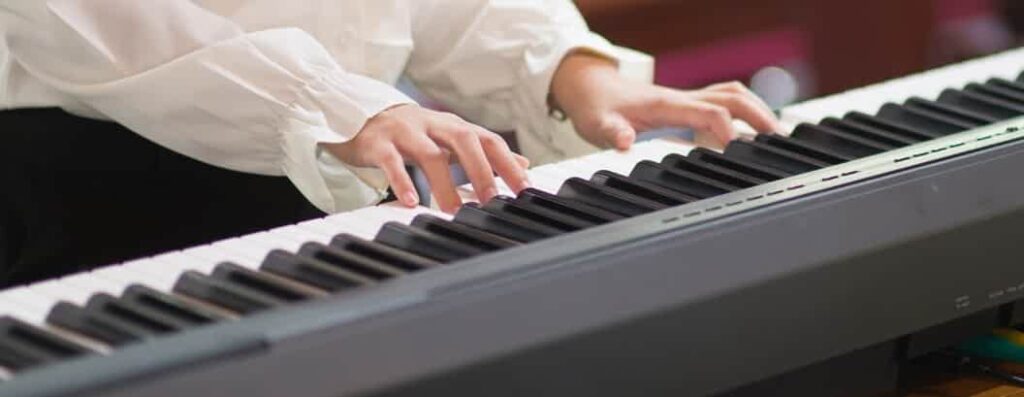
Age
Your age can significantly affect how quickly you learn to play the piano. Children tend to have more difficulty learning new skills, including playing musical instruments. This is because their brains are still developing and are more receptive to new information.
However, this doesn’t mean adults can’t learn to play the piano. Adults may have more discipline and focus, which can help them progress quickly.
Learning Style
Everyone has their own unique learning style. Some people learn best by watching others, while others prefer to read or listen to instructions. Knowing your learning style can help you find the right piano learning approach. If you’re unsure what your learning style is, try different methods until you find one that works best for you.
Practice Time
The time you spend practising the piano can also affect how quickly you learn. Consistent practice is key to making progress. You should aim to practice for at least 30 minutes daily, but ideally, aim for an hour or more. The more you practice, the faster you’ll improve.
Natural Talent
Some people are naturally gifted when it comes to playing musical instruments. They may have an ear for music or be able to pick up new skills quickly. However, even if you don’t have natural talent, you can still learn to play the piano. It may just take a bit more time and effort.
Teacher's Qualifications
Your good piano teacher can also significantly influence how quickly you learn. A qualified teacher can provide the right guidance and support to help you progress quickly. Look for a quality teacher with experience teaching piano students of your age and skill level.
Type of Piano
The type of piano you’re learning can also affect your progress. An acoustic piano may be more challenging to play than a digital piano, but it can also provide a more authentic playing experience. However, a digital piano may be a more affordable and practical option if you’re starting out.
Foundational Skills of Playing Piano
Basic Piano Knowledge

To learn piano, you need first to understand the basics. This includes learning the keyboard’s layout, understanding the difference between black and white keys, and knowing how to sit and position your hands correctly. You should also learn to read sheet music and understand basic musical notation.
Music Theory
Music theory is an important part of learning piano. This includes understanding the different types of notes, rhythms, and time signatures. You should also learn key signatures, dynamics, and other musical terms. By understanding music theory, you can read any music sheet and play music more effectively.
Scales and Chords
Scales and chords are the building blocks of music. You should learn how to play major and minor scales, as well as basic chords such as C major, G major, and F major. This will help you develop your finger strength and dexterity and give you a foundation for playing more complex pieces.
Learning the foundational skills of the piano can take some time, but it’s important to take the time to learn the basics and play basic songs properly. Doing so will set you up for success in your piano-playing journey.
Tips for Faster Piano Learning
1. Consistent Practice
Consistent practice is key to learning any new skill, and piano is no exception. Try to practice for at least 30 minutes daily, and gradually increase your practice time as you get more comfortable with the instrument. It’s better to practice a little bit every day than cram for hours once a week.
2. Setting Clear Goals
Setting clear goals can help you stay motivated and focused on your progress. Start by setting small, achievable goals, such as learning a new chord or playing a simple song. As you reach each goal, set new, slightly more challenging ones. This will help you build momentum and make steady progress.
3. Learning Music Theory
Learning music theory can help you understand the underlying principles of piano playing, making learning new songs and techniques easier. Start by learning the basics of music theory, such as scales, chords, and rhythm. You can find many online resources and books to help you get started.
4. Finding a Good Teacher
A good teacher can help you learn piano faster and more effectively than you would. Look for a teacher with experience teaching beginners and a teaching style matching your learning style. A good teacher can also help you stay motivated and on track with your goals.
5. Using Technology to Aid Learning
Many apps and online tools can help you learn piano faster and more efficiently. For example, some apps can help you practice sight-reading, learn music theory, and even analyze your playing to give you feedback on your technique. Experiment with different tools and find the ones that work best for you.
Basic Principles of Playing Piano
It’s important to understand that progress takes time, and there are no shortcuts to becoming a proficient concert pianist. However, by following some basic principles, you can make steady progress and enjoy the process of learning.
Consistent Practice
It’s better to practice for a shorter amount of time each day than to cram in a lot of practice on the weekends. Aim to practice for at least 30 minutes a day, and try to practice each day simultaneously so that it becomes a habit. Consistent practice will help you develop a sense of rhythm and improve your muscle memory.
Focused Practice
It’s not enough to practice for a certain amount of time each day; you also need to practice effectively. Focused practice means breaking down a piece of music into smaller sections and working on each section until you can play it smoothly.
Practising hands separately is also helpful, especially when you’re learning a new piece. By focusing on specific areas of difficulty, not just the hands, you’ll make faster progress and feel more confident in your playing.
Playing by Ear
Playing by ear is an important skill for pianists of all levels. It involves listening to music and then playing it back without sheet music. This skill can help you develop a better sense of rhythm and improve your improvisation ability. To practice playing songs by ear, listen to simple melodies and try to play them back on the piano. As you become more confident, you can try more complex pieces.
Recommended Digital Student Pianos

DESIGNED FOR: For: students who want to learn songs to practice at home or perform on stage.
FEATURES: Has improved action with the new Responsive Hammer Compact keyboard action
OTHER INFO: With Harmonic Imaging Sound Technology for producing a rich, detailed sound
Kawai ES120 Digital Stage Piano
When you check the price above, you’ll see there are loads of great places to buy this item. Our personal favorite is Gear4music.
It is the largest music retailer in the UK and fast becoming the most respected online music shop in the US too. Their customer service is excellent, they have competitive prices, really fast shipping, and usually have the longest guarantee.
Most professional musicians use Gear4music, so there is no reason why you shouldn’t too!
- Bluetooth audio allows for streaming device audio through piano speakers
- Includes a built-in lesson function for students to practice and improve their skills with various lesson songs and exercises
- With an extra speaker size and brand-new spatial headphone audio
- Its onboard speakers are slightly underwhelming
The professional musician who wrote this article combined many things,
from the product build, manufacturer’s reputation through to feedback
from other users, to create our famous TedScore™.
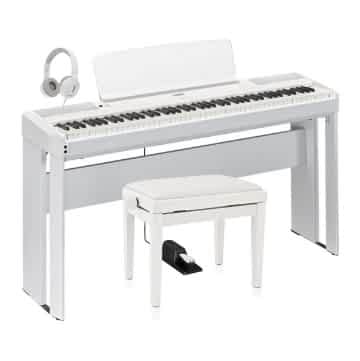
DESIGNED FOR: beginners to intermediate players
FEATURES: Comes with Enhanced Virtual Resonance Modelling for a superior aliquot effect
OTHER INFO: Has a Natural Wood X keyboard for an authentic touch
Yamaha P515 Digital Piano
When you check the price above, you’ll see there are loads of great places to buy this item. Our personal favorite is Gear4music.
It is the largest music retailer in the UK and fast becoming the most respected online music shop in the US too. Their customer service is excellent, they have competitive prices, really fast shipping, and usually have the longest guarantee.
Most professional musicians use Gear4music, so there is no reason why you shouldn’t too!
- Creates a truly immersive sound thanks to its 2-way speaker system
- Offers exceptional portability without compromise
- Ideal compact gigging piano with advanced features
- It may be a little heavy for some players at 22kg
The professional musician who wrote this article combined many things,
from the product build, manufacturer’s reputation through to feedback
from other users, to create our famous TedScore™.
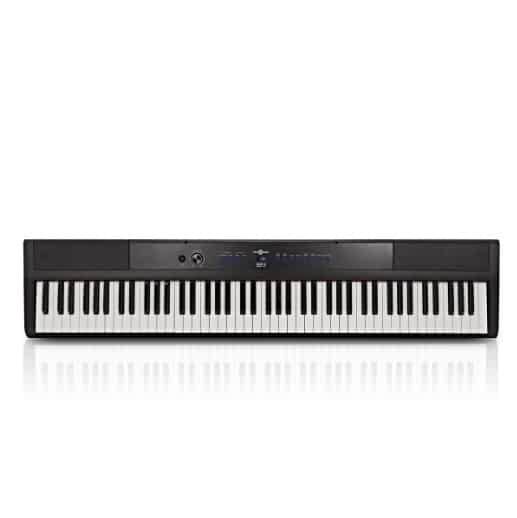
DESIGNED FOR: the beginner level musicians
FEATURES: A full 88-key stage piano with weighted action
OTHER INFO: With built-in stereo speakers and headphone output for silent practise
SDP-2 Stage Piano by Gear4music
When you check the price above, you’ll see there are loads of great places to buy this item. Our personal favorite is Gear4music.
It is the largest music retailer in the UK and fast becoming the most respected online music shop in the US too. Their customer service is excellent, they have competitive prices, really fast shipping, and usually have the longest guarantee.
Most professional musicians use Gear4music, so there is no reason why you shouldn’t too!
- Comes with Stereo RCA outputs and MIDI over USB
- Comes with eight different, high-quality voices to experiment with
- Only has eight sounds to choose from
The professional musician who wrote this article combined many things,
from the product build, manufacturer’s reputation through to feedback
from other users, to create our famous TedScore™.

DESIGNED FOR: beginner to intermediate piano player
FEATURES: Boasting Korg's Japanese-made Real Weighted Hammer Action 3 (RH3) keybed
OTHER INFO: With a two-track song recorder to capture your performance
Korg G1 Air Digital Piano
When you check the price above, you’ll see there are loads of great places to buy this item. Our personal favorite is Gear4music.
It is the largest music retailer in the UK and fast becoming the most respected online music shop in the US too. Their customer service is excellent, they have competitive prices, really fast shipping, and usually have the longest guarantee.
Most professional musicians use Gear4music, so there is no reason why you shouldn’t too!
- Improved design with less flex in the pedalboard and less wobble while playing
- Provides a cleaner aesthetic if you need to have lots of cables behind your piano
- Let's you play with expression from the delicate pianissimo to the powerful fortissimo
- Only three reverb types are available
The professional musician who wrote this article combined many things,
from the product build, manufacturer’s reputation through to feedback
from other users, to create our famous TedScore™.
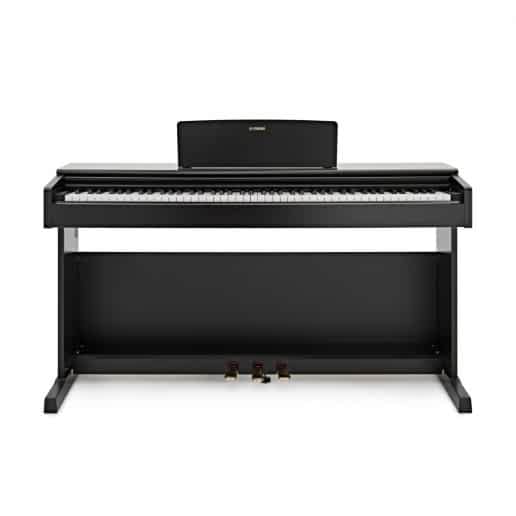
DESIGNED FOR: student musicians
FEATURES: Boasts a powerful sound set with true-to-life resonance
OTHER INFO: With Graded Hammer Standard (GHS) keyboard for a realistic touch and feel
YAMAHA YDP 145 Digital Piano
When you check the price above, you’ll see there are loads of great places to buy this item. Our personal favorite is Gear4music.
It is the largest music retailer in the UK and fast becoming the most respected online music shop in the US too. Their customer service is excellent, they have competitive prices, really fast shipping, and usually have the longest guarantee.
Most professional musicians use Gear4music, so there is no reason why you shouldn’t too!
- Includes a dual voice mode for combining two different sounds
- Beautiful design with realistic tone escapement
- Includes three months of Flowkey Premium
- No Bluetooth option is available
The professional musician who wrote this article combined many things,
from the product build, manufacturer’s reputation through to feedback
from other users, to create our famous TedScore™.
How Long Does It Take To Learn Piano
Summary
Learning the piano is an exciting journey! Depending on your goals, reaching different levels can take time. To sum up, here’s a nifty breakdown of the article:
- Beginner Skills: 3-6 months
- Intermediate Skills: 1-5 years
- Advanced Skills: 10-15 years
- Concert Pianist: 20+ years
With regular practice, you’ll progress through various stages. Playing for pleasure or aiming for a specific genre like jazz or pop can guide your timeline.
Starting to play may seem daunting at first, but take it one step at a time. Every practice session brings you closer to your goals.
The key is consistency and enjoying the process. So, happy playing, and remember, the piano is as rewarding as it is challenging! Enjoy every note and milestone along the way.
Wait, there’s more!!!
To make your piano playing experience easier and more fun, check out this list of amazing 14 Accessories for Piano to get your hands on!
FAQ's
Learning piano can be challenging, especially for an adult beginner if you have no prior musical background. However, you can learn to play the piano with consistent practice and a good teacher.
Learning to play the piano in one year is certainly possible, but it depends on various factors such as your dedication, practice time, and natural talent. You can make significant progress in one year with a structured learning plan and consistent practice.
You can teach yourself how to play the piano, but it can be challenging without proper guidance and feedback. Having a good learning plan, using online resources, and seeking feedback from piano teachers and other musicians can help improve your piano skills.
The time it takes to learn piano varies depending on factors such as dedication, practice habits, and personal goals. On average, beginners can expect to develop basic piano proficiency within a few months to a year, while reaching an advanced level may take several years of consistent practice and study.










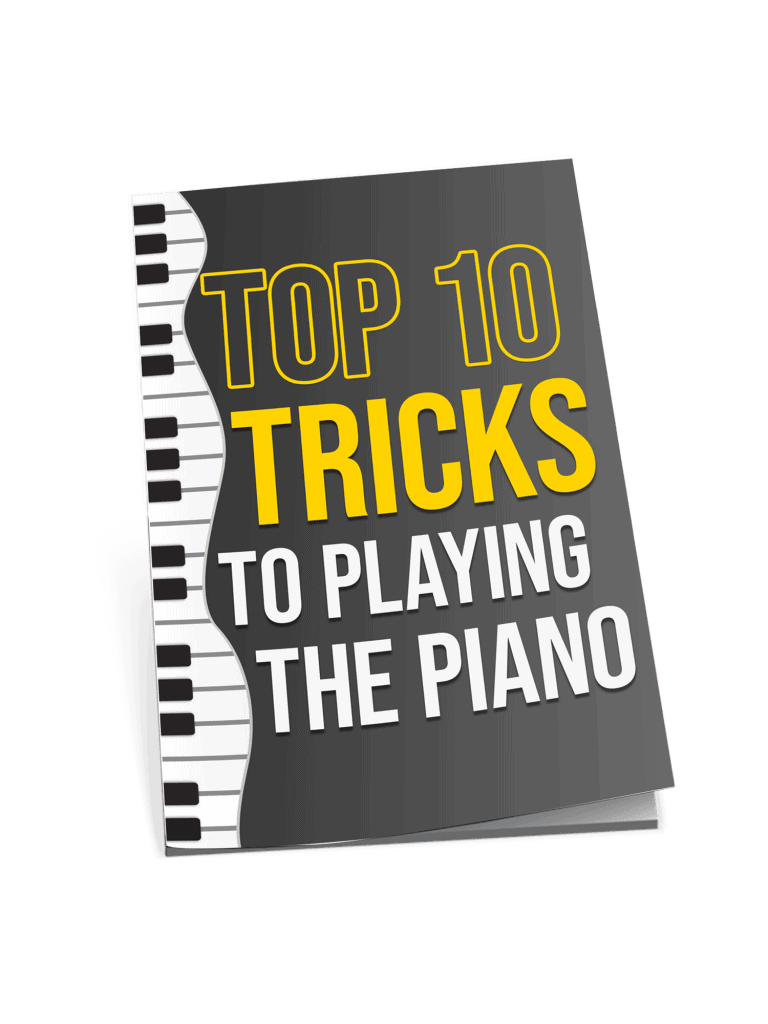
This is quite an insightful piece! I’ve been pondering over starting my 8-year-old on piano lessons, but I’m worried if it might be too challenging or if there’s an ideal age to begin. Any advice on easing kids into learning piano without overwhelming them? Also, are digital pianos a good start for beginners, or should I consider getting an acoustic one?
Interesting read, especially the section on using technology to aid learning. In the realm of IT, we often overlook the potential crossover benefits of tech in traditional fields like music education. Curious if there are specific apps or software you’d recommend that align with the structured principles outlined in your article, Robert Emery.
totally agree with the consistent practice part. it’s like the only way to get better. learned that the hard way with the guitar lol. now trying to do the same with the piano.
Absolutely, consistency is key! Keep at it, and you’ll be amazed at your progress!
Glad I stumbled upon this, Robert Emery. Quick Q: for someone who’s just starting and has about an hour each day to practice, would focusing more on scales or trying to play simple songs be better? Thanks in advance!